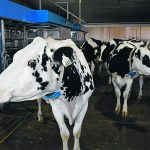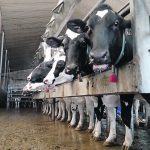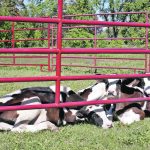World-first approach could reduce a herd’s methane emissions by 20-30 per cent by 2050, help meet industry’s GHG goals
A world-leading approach to creating a methane-specific breeding index has been developed by Lactanet. Not content to wait until “sniffer” technology for measuring bovine methane emissions eventually becomes more affordable, the Canadian dairy data collection and genetics analysis organization developed the index based on milk samples. “Canada will be the first country globally to offer […] Read moreStories by Stew Slater

Forage tests inform harvest strategy
A recent webinar by Lactanet’s expert in forage production and nutrition offered tips on how to interpret analyses of ensiled forage. Jean-Philippe Laroche asked participants to have copies of analyses for grass or legume silage so he could relate “what your forage analyses have to tell you and provide solutions” to address shortfalls or problems. […] Read more

Breeding can help tackle feed requirements
A new body maintenance index should help develop dairy cows that require less feed to maintain appropriate condition
Recently introduced body maintenance requirement evaluations for bulls should help dairy producers maximize production per kilogram of dry matter intake. Speaking at Lactanet’s open industry session, geneticist Dr. Allison Fleming said the body maintenance requirement is not directly related to feed costs per litre of milk. In fact, when creating its feed efficiency tools, Lactanet […] Read more
New research to look at dairy welfare, technology
The use of artificial intelligence to help farmers improve dairy animal care will be studied on Ontario and Quebec farms
A new research collaboration at McGill University and the University of Quebec in Montreal will explore the role of artificial intelligence in promoting dairy cattle welfare. The project aims to create “a digital living lab to link animal welfare and dairy farms’ profitability.” An updated Code of Practice for the Care and Handling of Dairy […] Read more
Emerging genetic defect in Holstein uncovered
North American dairy breeding groups are providing early advice to protect herds against a newly discovered and potentially fatal genetic defect affecting Holstein calves. The first official word on the defect, referred to as calf recumbency, came through a joint news release on April 3 from the U.S. Council on Dairy Cattle Breeding (CDCB), Holstein […] Read more




